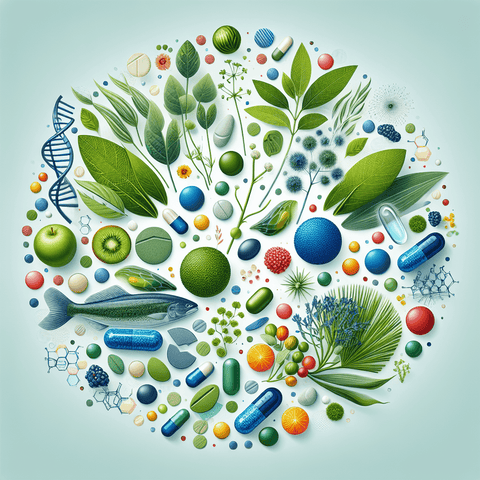Introduction
Dietary supplements have become an integral part of modern wellness strategies, often used to fill nutritional gaps, support specific bodily functions, and promote long-term health. With a growing awareness of how vital nutrients support our health, more individuals are exploring supplements to enhance their physical and mental well-being. But with such a saturated market, one of the most critical questions remains: Which dietary supplements truly make a difference?
In this comprehensive guide, we will explore five categories of dietary supplements that are scientifically supported and widely recognized for their beneficial effects. These aren’t fads or hearsay—these are supplements backed by evidence and recommended by nutrition professionals. Whether you’re looking to improve your energy levels, support your immune system, enhance brain function, or promote holistic health, these supplements can be game-changers. We'll also provide practical guidance on how to choose the best products and incorporate them smartly into your lifestyle.
1. Understanding Dietary Supplements: Essential Tools for Optimal Nutrition
Dietary supplements are concentrated sources of vitamins, minerals, or other nutrients and substances with a nutritional or physiological effect. Delivered in dosage forms such as capsules, tablets, powders, or liquids, they are intended to supplement — not replace — a balanced diet. In today's fast-paced world, where nutritional deficiencies are increasingly common due to soil depletion, processed food consumption, and busy lifestyles, supplements can play an essential supportive role.
While the ideal scenario involves receiving all necessary nutrients from a diverse diet rich in whole foods, real-world limitations often prevent this. That’s where supplements step in. For example, Vitamin D, which our skin synthesizes upon exposure to sunlight, may be insufficient in people living in northern climates or during winter months. Iron is another common nutrient that's often deficient, especially among menstruating women, vegetarians, or people with gastrointestinal issues.
It's important to make a clear distinction between food-based nutrition and supplementation. Foods deliver not just vitamins and minerals but also dietary fiber, antioxidants, and phytonutrients in forms that are often more bioavailable. Supplements, however, provide a convenient and controlled dose, which may be necessary in medically diagnosed deficiencies or increased nutritional needs.
When choosing supplements, safety and quality should be top priorities. Not all supplements are created equal. Look for products that are manufactured under Good Manufacturing Practices (GMP), tested for third-party verification, and specify the source and dosage of active ingredients. Always check for possible allergens and artificial fillers. Reliable platforms like Topvitamine.com offer curated selections of high-quality, lab-tested dietary supplements that meet European safety standards.
Lastly, consult a healthcare professional before starting any supplement, especially if you're pregnant, nursing, taking medications, or have existing health conditions. Bio-individuality is key: what works for one person may not work for another due to differences in genetics, health status, and lifestyle. Personalized nutrition ensures you're not only taking the right supplements but also avoiding unnecessary or potentially harmful ones.
2. Essential Nutrient Boosters: Unlocking the Power of Micronutrients
While macronutrients—carbohydrates, proteins, and fats—are needed in large quantities for energy and body functions, micronutrients are critical in smaller amounts for prevention of disease, growth, and optimal metabolic functioning. A host of micronutrients can be supplemented, but five consistently stand out as universally beneficial: Omega-3 fatty acids, Vitamin D, Magnesium, Zinc, and Iron.
Omega-3 fatty acids, particularly EPA and DHA, provide essential support to the cardiovascular system, cognitive functions, and reducing chronic inflammation. Typically found in fatty fish, supplementation is vital for individuals who don’t consume adequate sources. Studies have linked omega-3 supplementation with improved mood disorders, cardiovascular health, and healthier lipid levels. Visit Topvitamine’s Omega-3 collection to explore high-purity fish oil and vegan alternatives.
Vitamin D is another essential nutrient commonly lacking in populations worldwide. It plays a critical role in calcium absorption, immune regulation, and muscle function. EFSA acknowledges its contribution to maintaining normal bones, immune system function, and calcium blood levels. The need for supplementation is especially relevant in low-sunlight regions, offering a straightforward and safe way to improve health outcomes. Look into Topvitamine’s Vitamin D section for various form and dosage options.
Magnesium supports over 300 biochemical reactions in the body, impacting muscle function, nervous system health, blood glucose control, and energy production. It’s commonly depleted by alcohol, stress, and chronic illness. For those lacking in leafy greens, legumes, and seeds, supplementation may significantly improve energy levels and reduce muscle cramps. Check out Topvitamine’s Magnesium range for bioavailable options like magnesium glycinate and citrate.
Zinc plays a vital role in immune function, wound healing, and DNA synthesis. Deficiencies may impair taste, smell, and immune responsiveness. Supplementing zinc, particularly during cold season, has been associated with shortened durations and less severe symptoms of viral infections.
Iron is crucial for hemoglobin production and oxygen transport in blood. Iron deficiency anemia is among the most common forms of nutritional deficiency, especially among women. Supplementation must be approached carefully, as excess iron can lead to toxicity. Iron should be taken with Vitamin C to improve absorption and must be monitored through blood tests.
Before adding any micronutrient supplement, it's important to identify potential deficiencies through appropriate lab work. For most people, safe dosages can offer considerable benefit in maintaining immunity, reducing fatigue, and enhancing cognitive function.
3. Herbal Supplement Benefits: Nature’s Remedies for Wellness
For centuries, herbal supplements have bridged the gap between traditional healing and modern medicine. Phytochemicals — bioactive compounds present in plants — offer natural ways to regulate inflammation, support immunity, improve stress response, and enhance detoxification. Five herbal supplements hold notable evidence for their health-supportive roles: Turmeric (curcumin), Ashwagandha, Ginseng, Echinacea, and Milk Thistle.
Turmeric, specifically its active compound curcumin, has powerful anti-inflammatory and antioxidant properties. It is widely used for joint health, managing oxidative stress, and supporting liver function. Curcumin’s bioavailability can be enhanced when paired with black pepper extract (piperine).
Ashwagandha is an adaptogenic herb traditionally used in Ayurvedic medicine. It helps modulate the stress hormone cortisol and supports energy, endurance, and mood. EFSA affirms its role in maintaining mental and physical capacity in cases of weakness, exhaustion, and loss of concentration.
Ginseng, particularly Panax ginseng, is utilized for improving mental clarity, stamina, and immune function. It supports the body’s resistance to physiological and psychological stress, and ongoing research suggests its potential in metabolic health and fatigue reduction.
Echinacea is commonly associated with immune health. Research suggests that it may support the body’s defenses against common colds and seasonal illnesses by modulating immune cell function. However, its use is best timed around the onset of symptoms and not meant for chronic use.
Milk Thistle is renowned for its detoxifying support to the liver. The active compound silymarin contributes to protecting hepatic cells from oxidative stress and promoting liver regeneration.
When integrating herbal supplements, it’s crucial to consider product standardization. Look for extracts standardized to active ingredients like “withanolides” for Ashwagandha or “silymarin” for Milk Thistle. Additionally, discuss possible interactions with medications like blood thinners, antidepressants, or immunosuppressants with your healthcare provider. The synergy between tradition and science makes herbal supplements potent allies when used responsibly.
4. Vitamins and Minerals: The Building Blocks for Vitality
Vitamins and minerals are foundational to almost every cellular process in the human body. From converting food into energy to protecting cells from damage, their functions are vast. Among the most beneficial to supplement where appropriate are B-complex vitamins, Vitamin C, Calcium, Selenium, and Iodine.
B-Complex Vitamins include B1 (thiamine), B2 (riboflavin), B3 (niacin), B5, B6, B7 (biotin), B9 (folate), and B12. Collectively, they support the nervous system, brain function, energy metabolism, and the production of red blood cells. B12 is especially important for vegetarians and older adults who may lack intrinsic factor for proper absorption. Folate is essential during pregnancy for fetal development.
Vitamin C, beyond its well-known antioxidant role, facilitates collagen synthesis, enhances iron absorption, and supports immune function. Humans cannot synthesize Vitamin C and must obtain it through dietary intake or supplementation. Explore Topvitamine's Vitamin C supplements for high-potency, buffered, or liposomal options tailored for superior absorption.
Calcium is vital for bone strength, nerve transmission, and muscle contraction. When dietary calcium is insufficient, supplementation helps meet EFSA’s guidelines for bone maintenance, particularly in elderly populations at risk of osteoporosis. A balanced calcium↔magnesium↔Vitamin D intake symphony ensures proper assimilation and bone health.
Selenium functions as an antioxidant and supports thyroid function by aiding iodine metabolism. Food sources vary greatly by soil selenium content, making supplementation useful in selenium-poor regions. Adequate levels also help protect against oxidative stress and support sperm motility.
Iodine is a trace mineral needed for the synthesis of thyroid hormones, which regulate metabolism, energy, and mood stability. Iodine deficiencies can lead to goiter and developmental delays during pregnancy. Seaweed, fish, and iodized salt help, but supplementation ensures consistent availability.
Best practices for vitamin and mineral supplementation include taking them with meals for enhanced absorption and using forms that mirror their natural dietary forms (e.g., methylcobalamin for B12, L-ascorbic acid for Vitamin C). Be cautious with mega-doses. Fat-soluble vitamins (A, D, E, K) can accumulate in tissues, making moderation and testing essential.
5. Natural Health Enhancers: Supporting the Body’s Innate Healing Powers
Beyond the essential nutrients, certain supplements support the body’s ability to repair, regenerate, and maintain resilience through aging or illness. These include Probiotics, Collagen, Coenzyme Q10 (CoQ10), and — once again — Turmeric for its wide-reaching support.
Probiotics are live microorganisms that, when administered in adequate amounts, confer a health benefit. They promote gut health, enhance the intestinal barrier, and reduce gastrointestinal discomfort. Their impact on the gut-brain axis also makes them influential in mood and mental clarity.
Collagen is the most abundant protein in the human body, essential for skin elasticity, joint lubrication, and wound healing. Collagen synthesis declines with age, leading to visible aging signs and joint issues. Hydrolyzed collagen peptides from bovine or marine sources boast improved absorption and can improve skin hydration, elasticity, and joint flexibility over time.
CoQ10 is an antioxidant involved in mitochondrial energy production. It aids cardiovascular health and reduces statin-induced muscle fatigue — an important consideration for individuals on cholesterol-lowering medications.
Turmeric is included again here, showcasing its status as a versatile supplement for combating systemic inflammation and oxidative stress.
The key to integrating these health enhancers is consistency and choosing clinically studied dosages. Timing matters, too — for example, CoQ10 is best taken with meals containing fat, and collagen effectiveness may increase when paired with Vitamin C.
6. Plant-Based Supplements: Harnessing Nature’s Power for Holistic Wellness
The surge in popularity of plant-based diets has catalyzed corresponding growth in plant-based supplements. Derived from nutrient-rich superfoods, these supplements deliver vitamins, minerals, phytonutrients, and antioxidants with minimal environmental impact. Leading examples include Moringa, Spirulina, Wheatgrass, Maca, and Baobab.
Moringa offers a rich profile of vitamins A, C, and E, along with calcium, potassium, and protein. Known as the "miracle tree," it supports immune health, reduces inflammation, and provides cleansing benefits.
Spirulina is a blue-green algae dense in protein, iron, B vitamins, and chlorophyll. It promotes energy, supports detoxification, and provides antioxidant protection. Studies show promise in cholesterol modulation and endurance enhancement.
Wheatgrass is packed with chlorophyll, amino acids, enzymes, and fiber. Its alkalizing effects and liver support properties make it a popular daily health boost in juices or powders.
Maca root is revered for regulating hormones and enhancing libido, energy, and endurance. Its high nutrient density and adaptogenic effects make it favorable for stress resilience and metabolic balance.
Baobab is a cherished African fruit powered by fiber, Vitamin C, and antioxidants. It aids in digestion, blood sugar regulation, and skin vitality.
When choosing plant-based supplements, ensure they are organically grown, minimally processed, and tested for contaminants. Shelf-stable powders and capsules offer convenience, and their neutral flavors blend seamlessly into smoothies or meals.
Conclusion: Prioritizing the Supplements That Truly Make a Difference
The dietary supplement realm is vast, but when navigated wisely, it yields tremendous health benefits. The key takeaway lies in choosing high-quality, evidence-based supplements that align with your individual needs. Omega-3s, Vitamin D, Magnesium, and select herbs or superfoods can all meaningfully enrich bodily function and safeguard long-term health.
Empowerment comes from education — and once you’re informed, partnering with reputable sources like Topvitamine.com ensures you access top-rated products designed for purity, potency, and efficacy. We encourage you to view supplementation not as a quick fix but as a commitment to sustained wellness. Balance is everything, so prioritize a nutrient-dense diet, informed supplementation, and regular check-ins with qualified professionals.
Q&A Section
Q: Are dietary supplements safe for everyone?
A: Most dietary supplements are safe for the general population when consumed at appropriate doses. However, specific groups (e.g., pregnant women, individuals on medications) should consult healthcare professionals before starting supplementation.
Q: How can I tell if I need supplements?
A: Nutritional testing and professional evaluation are the best ways to identify deficiencies. Symptoms like fatigue, poor immune response, or mental fog may also signal nutrient gaps.
Q: Can supplements replace a healthy diet?
A: No, supplements are designed to complement—not replace—a balanced diet. Whole foods offer fiber, enzymes, and phytonutrients not present in isolated supplements.
Q: What’s the best way to choose a high-quality supplement?
A: Look for evidence-based formulations, third-party testing, GMP certification, and transparency of ingredients. Brands on Topvitamine.com adhere to strict quality standards.
Important Keywords
- dietary supplements
- best vitamins for immunity
- omega-3 EPA DHA supplements
- vitamin D for energy
- magnesium supplements for muscles
- buy herbal supplements online
- top vitamin C product EU
- buy CoQ10 online
- plant-based nutrition support
- holistic wellness booster



